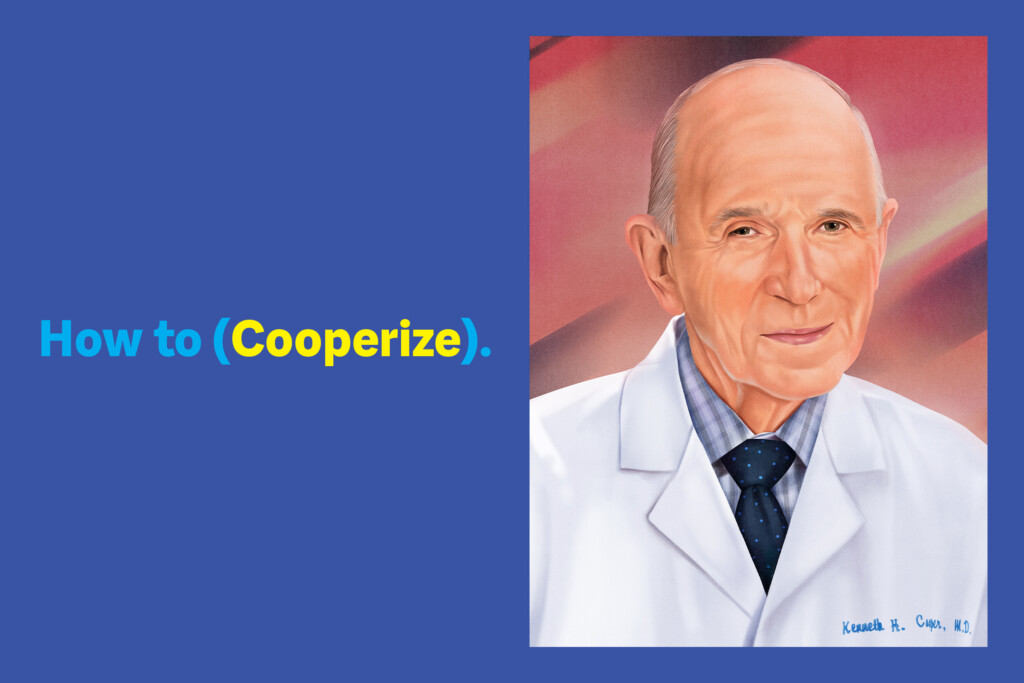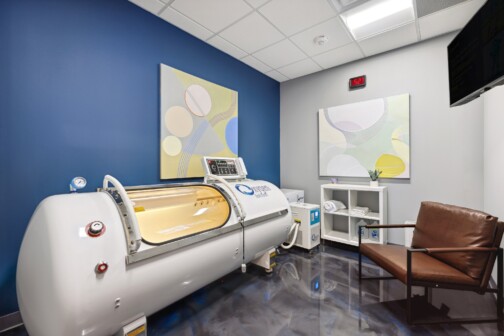
A couple straight out of an ’80s John Hughes movie walks hand-in-hand back to their car after an intense workout. Wearing matching white polos with pastel sweaters loosely (but expertly) tied around their shoulders, they dab sweat from their brows with white towels. They walk in slow motion—not because time is slowing down to make their matching haircuts blow perfectly in the wind but because Herb has that knee thing that’s been acting up. Here in the Cooper Aerobics Center parking lot, they’re still the “cool kids,” albeit in their 60s now.
You’ve mindlessly passed this manicured landscape countless times as you sped down Preston on your way to sit in LBJ bumper-to-bumper. In addition to the medical buildings, there are a number of other facilities on the clinic’s campus—the Cooper Fitness Center, a hotel, a restaurant, a spa, tennis courts, a pond frequented by Canadian geese—that make it look more like a country club. But the Cooper Aerobics Center has been in the business of health and wellness for more than 50 years. Today, the center includes six health and wellness companies and one nonprofit.
Cooper Aerobics Center offers breast health testing, preventive and cosmetic dermatology, 24/7 concierge medicine, gastroenterology and cardiology specialists, optometry evaluations, sleep medicine, and a broad range of nutrition services. Patients can receive test results, an in-depth picture of their health, and an action plan to improve it, all in the same day. Staff want you to “reach and sustain the best health possible.”
But the most fascinating part of my tour of the Cooper campus by far was the Cooper Fitness Center. The golden-years gym rat culture is unmatched. The reason: a lot of the AARP crowd have been Cooper Fitness Center members since the clinic opened, in 1970. Their children and grandchildren are now members, too.
In 1968, Dr. Kenneth Cooper coined the term “aerobics” to describe a new exercise program to improve heart health. What? You thought Jane Fonda invented aerobics? Maybe more people would have given him the credit if he had just put on some leg warmers. In his Aerobics, which has sold more than 30 million copies, Cooper states, “I’m not an anarchist, but I guess I’d like to start an aerobic revolution.” (Can’t you just picture aerobics anarchists, though? There’s a lot of sweatbands and bright leotards but also pyrotechnics, like a Katy Perry concert had an exercise baby.) “I’d like to see that day, when America has made one more comeback, reversing the ultimate consequences of an affluent society and its inbred inactivity,” his book continues.
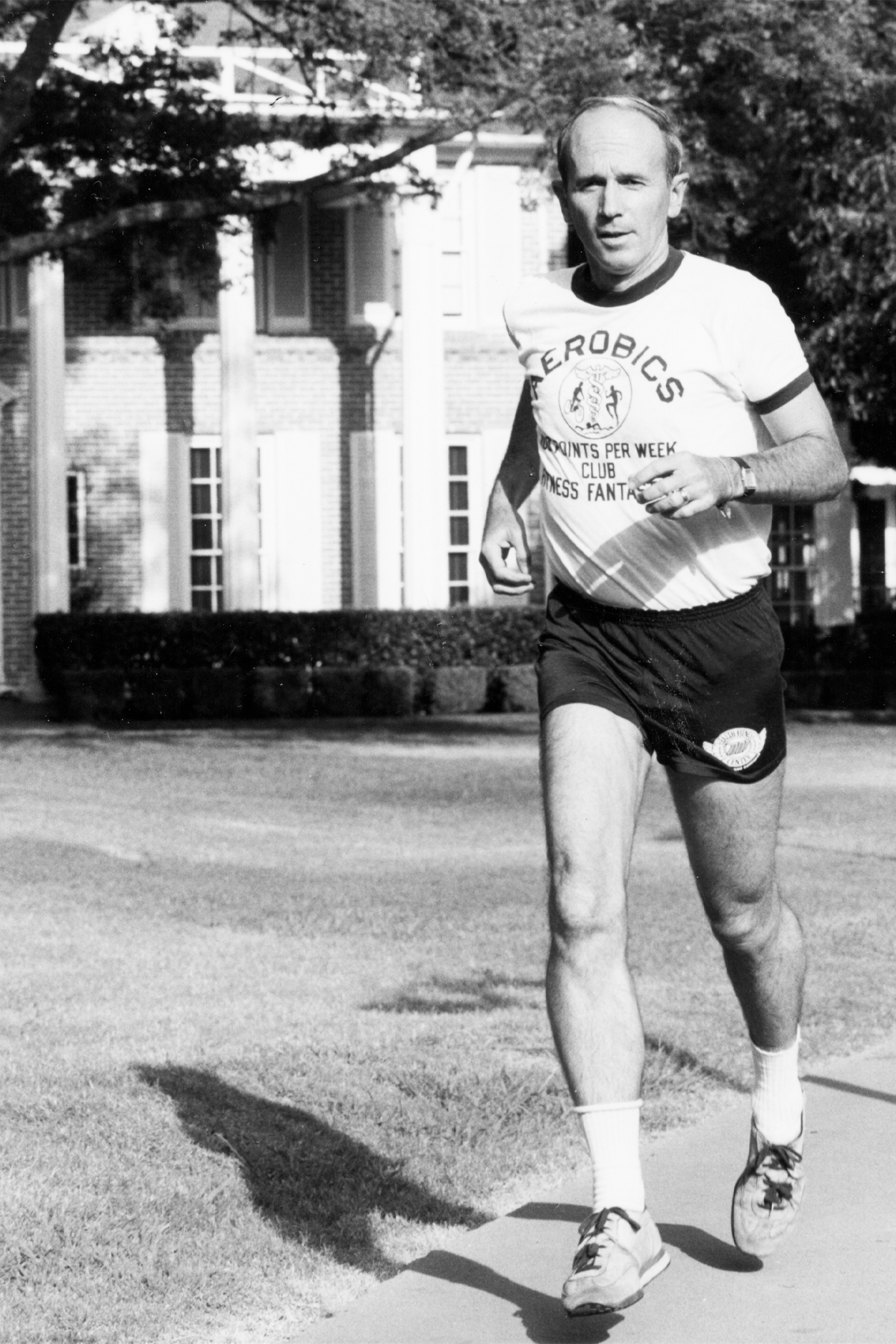
Aerobics includes a point system for a variety of exercises, awarding 1 point for skating for 15 minutes (ice or roller) and 14 points for running in place if you can average 80 to 90 steps per minute for 25 minutes. This book was Weight Watchers for exercise. It was Fitbit decades before Fitbit. “I have a Fitbit right here,” Cooper says as he shows me his watch. “I use the data. I try to get 5,000 steps per day. But I usually don’t, because I don’t get any steps for my cycling.”
Within the first few months after his book was published, Cooper became overwhelmed with lecture requests. In a soon-to-be-released documentary, Cooper’s wife, Millie, recalls how she would often accept the speaking engagements and present on Cooper’s behalf because, after typing his book, she knew more about preventive medicine than most physicians at the time. “I’ll never forget speaking at this one Christian university,” she says. “This kid said, ‘Ms. Cooper, do you think you’re going to hell if you smoke or drink?’ I said, ‘I don’t know where you’re going, but you’re gonna find out sooner.’ ”
After compiling decades of research, Cooper has an even more specific road map to better overall health. “There are many different things you can do that can prolong your life when you’re talking about longevity,” he says. “And we have proof.”
Conduct as many research studies as you want, but seeing a line of people in their 70s fight over whose turn it is to work their lats is proof enough for me that what Dr. Kenneth Cooper is selling is working.
Grandpa-bros brag to each other about Leg Day while they sip fiber-rich smoothies. A distinguished woman looks extremely tired walking the indoor track until she spots a young trainer and begins to book it, waving eagerly at him as she passes by. In a blink, she transforms into someone two generations younger. Her shoulders pull back, her spine straightens, and her power-walking arms swing with the fierceness of a fortysomething. A daughter tells her father she’s not sure he should take the stairs. He switches his gym bag to his good shoulder and replies, “Did I ask?”
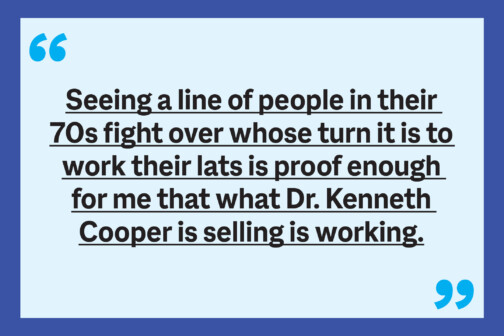
According to the Centers for Disease Control, average life expectancy for men in the United States is 73.5 years. For women, it’s 79.3 years. Maybe you’re looking at the average life expectancy and you’re saying, “I can do better.” Of course, you know it takes sacrifice and dedication. You’re willing to cut carbs sometimes (but not pizza carbs, which don’t count); you’ll absolutely remove Diet Coke from your daily routine (so long as you can sub in Coke Zero); and you already exercise five times a week. (Well, three. Well, once. You take the stairs sometimes. OK, never. But you’ve been super busy caring for your pets lately.) Point is, you’re a work in progress, and you’re ready to pay someone to help.
So what does it take? What would you do to outlive all your friends?
Dr. Kenneth Cooper thinks you should get Cooperized™. (No, that’s not a salacious invitation. The man is a devout Christian who is happily married, and he just celebrated his 64th wedding anniversary.) “Our men [at the Cooper Aerobics Center] are averaging 86.5 years. For women, ours are 90.4 years. That’s 10 years longer than the national average. And they do that by getting Cooperized.” (Nota bene: your ZIP code also plays a large role in determining your life expectancy. According to data from UT Southwestern, in Highland Park, men average 82.2 years and women average 85.4 years; in parts of South Dallas, men average 63.6 years and women average 72 years.)
There are eight steps to getting Cooperized: 1) maintain a healthy weight; 2) make healthy food choices; 3) exercise most days of the week; 4) take the right supplements for you; 5) do not use tobacco; 6) control alcohol; 7) manage stress; and 8) get a regular, comprehensive physical exam. Above all, Cooper says, “The best return on your investment is to avoid inactivity.”
When it comes to his lifestyle, Dr. Cooper definitely drinks his own Kool-Aid. (Metaphorically, of course. He says, “Sugar is the worst thing you can eat.”) He estimates that he ran 38,000 miles over 40 years, stopping only after he broke his leg. Now the 92-year-old rides a recumbent bike for 30 minutes five times a week and still walks his dog daily because, as he has said for years, “You should walk the dog every day, whether you have one or not.”
His only vice: Dr Pepper. He drinks one mini 8-ounce Dr Pepper every day, poured into a paper cup, served neat.
“I was so criticized in the beginning,” he says. “But I’ve outlived most of the critics.”

Cooper takes me on a tour of his office, which is a rich display of his achievements. “These are the shoes I ran in for my first Boston Marathon. I placed 101st.” He smiles proudly and then adds, grandpa-joke-style, “Only 100 people ran it back in those days.”
There are so many awards in his office that he has run out of wall space. “Have you ever seen a Super Bowl ring?” Nope. He rifles through a drawer for a minute and then pulls out the ring he was given when he was inducted into the National Football Foundation Leadership Hall of Fame, in 2015.
He has framed certificates and photos with world leaders and celebrities stacked on every flat surface. He flips through them like records. “Do you recognize anyone in this picture?” Yes, sir. The former president has a somewhat memorable face, I guess. “George W. Bush has been my patient since about 1988, a long time,” Cooper says. “He’s the most highly conditioned president we’ve ever had.”
As a Cooper Aerobics Center patient, you are asked to submit to a comprehensive assessment of your fitness, including a treadmill stress test (which Cooper popularized). One day, the time came for the younger Bush to take his turn on the treadmill. “George is very competitive,” Cooper says. “He wanted to be in the top category of fitness. I was standing there behind the treadmill, and the chief of cardiology was right beside me. And he kept going.” As the speed continued to increase, Cooper asked, “George, you wanna quit?” Bush refused to quit. Becoming increasingly concerned, the cardiologist turned to Cooper and said, “You’re going to kill the President.”
Bush made it through the test just fine. In fact, he ranked in the top five percentile in the treadmill stress test. “He did that while he was president of the United States,” Cooper adds.

Cooper is also responsible for the invention of the FitnessGram test that school districts use annually to gauge the physical fitness of students enrolled in grade three or higher. If you’ve never heard of this test, simply find a 10-year-old, say the word “FitnessGram,” and prepare for the worst. Part of the assessment requires children to run back and forth on a basketball court at increasing paces over time. It’s like a treadmill test without a treadmill. If you fail to complete a lap before the buzzer buzzes two times in a row, your test is over. When I YouTubed the FitnessGram buzzer and played it for my kid before school, she immediately stopped making her lunch and said, “NO. Stop it. You can’t do that to me, Mom. It’s not funny.” So, that’s some trauma she’ll need to unpack later. Seems like it’s this generation’s version of the Presidential Fitness Test. Remember that?
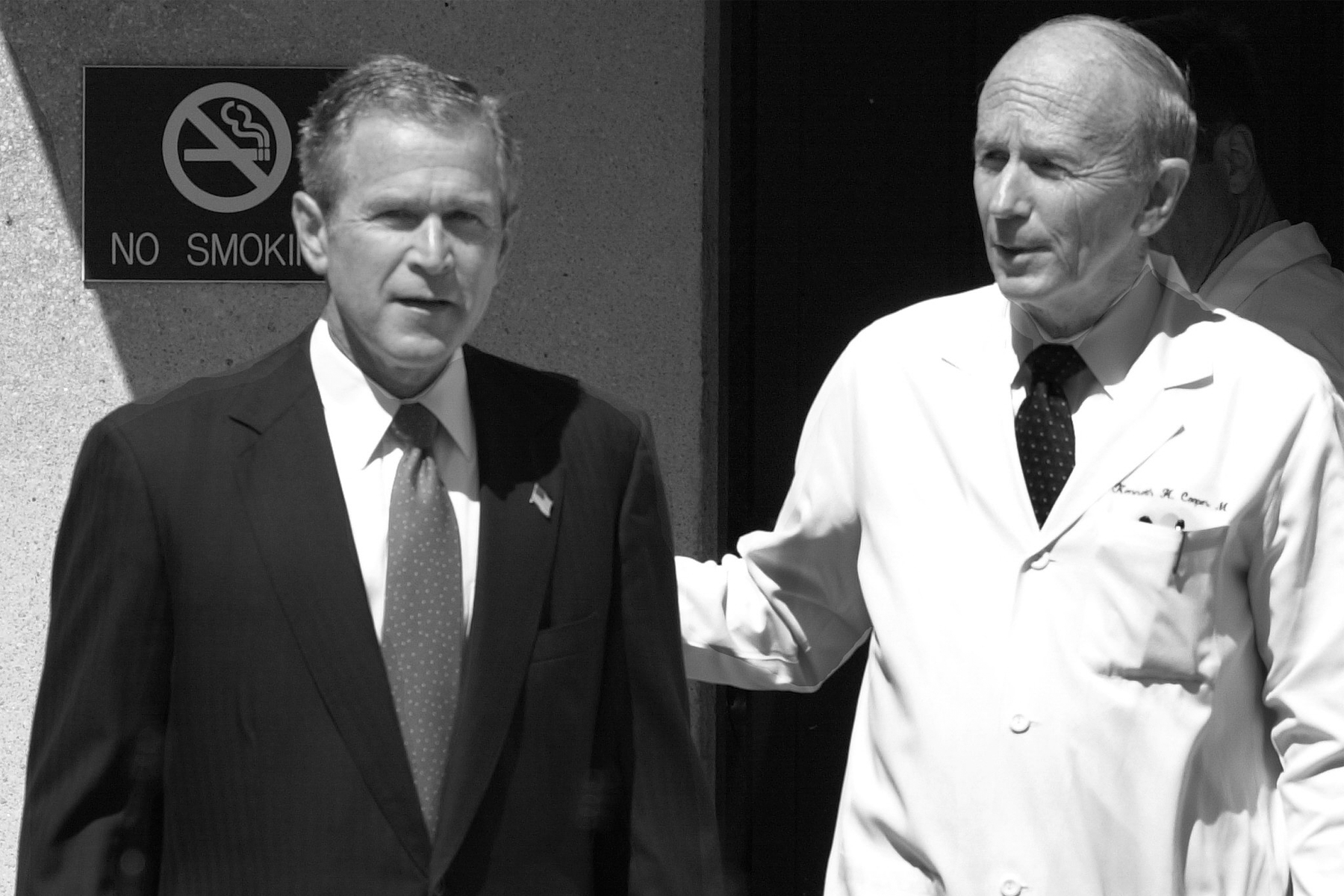
When Cooper told me he invented the FitnessGram, like someone realizing they have a mutual friend, I said, “Oh! My kids hate you!” He smiled.
Evidently, this happens to Cooper often. People eagerly tell him they hate him all the time. A normal person might be upset by this kind of reaction, but to him it’s high praise. Of all the stories he tells on this day, these seem to be his favorite. “I worked with George and Barbara Bush and their literacy programs that they’ve had here in town,” he says. As a major contributor, Cooper had the chance to attend a party with authors involved in the effort, including John Grisham. “I read all of his books; in fact, I’m reading one of his books right now,” he says. Cooper approached Grisham and introduced himself. “Grisham said, ‘Just a minute—you’re Dr. Kenneth Cooper. You wrote Aerobics.’ I said, ‘Yes.’ He said, ‘I hate you. I had to take that darn Mississippi state test so many times. I hate it. But you know what? I’m still running.’ ”
Another time, Cooper was on a cruise down the Rhine from Basel to Amsterdam. “So, we got to Amsterdam, and the captain and I had become good friends,” Cooper says. To commemorate the trip, the captain asked for a photo with Cooper. He also asked if his daughter could get a photo. “I said, ‘Why do you want that?’ When she came out, she said, ‘I wanted to take this photo with you. I had to take that darn 12-minute test—that Cooper test. I wanted to see who made me suffer so much.’ ” He laughs.
He invented aerobics. He popularized the treadmill stress test. He invented the FitnessGram test. And he still chooses Jazzercise over Camp Gladiator any day. He has made a career out of helping people get healthy, and “I hate you” is the thanks he gets. Somehow, at 92 years old, Dr. Cooper couldn’t be happier. Must be all that Dr Pepper.
This story originally appeared in the October issue of D Magazine with the headline, “The Father of Aerobics.” Write to [email protected].
Author



